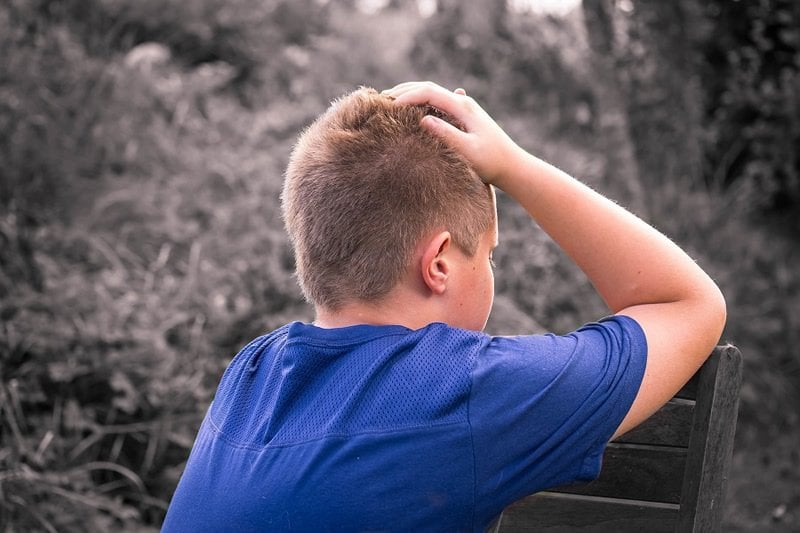Summary: Adults who were maltreated as children have an increased risk of being diagnosed with schizophrenia, psychosis, bipolar disorder, and anxiety than their peers who were not abused.
Source: University of Birmingham
A study by the University of Birmingham has shown that children who have experienced child abuse or neglect are four times more likely to develop serious mental illness such as psychoses, schizophrenia and bipolar disorder.
Researchers studied GP records dating between 1995 and 2018 of 217,758 patients aged under 18 who had experienced, or were suspected to have experienced, childhood maltreatment or related concerns, and then compared them to the records of 423,410 patients who had not.
The study, published today in The Lancet Psychiatry, found those patients who were maltreated were more than twice as likely to develop serious mental ill health such as psychoses, schizophrenia and bipolar disorder, or require a prescription to treat mental ill health, compared to those who have no recorded experience of maltreatment. The researchers also found maltreated children were more than twice as likely to develop some form of mental illness, such as depression or anxiety.
Childhood maltreatment, defined as any form of physical, sexual or emotional abuse and neglect, is a global public health and human rights issue affecting more than one in three children aged under 18.
This was the biggest study of its kind to explore the association between abuse or neglect in childhood and the development of mental illness.
The researchers also found a clear under-recording of child maltreatment in GP records, and say potential opportunities to spot child maltreatment or implement management plans for these vulnerable individuals are being missed.
First author Dr Joht Singh Chandan, Academic Clinical Fellow in Public Health at the University of Birmingham’s Institute of Applied Health Research, said: “Our findings, along with evidence from other global studies, demonstrates the substantial burden of mental ill health following child abuse or neglect.

“Considering the prevalence of maltreatment, it is clear we are not doing enough to prevent and detect this important risk factor for mental ill health.”
“There is a desperate need to rethink our public health approach to preventing and detecting childhood maltreatment and its associated negative consequences.”
Corresponding author Julie Taylor, Professor of Child Protection at the University of Birmingham’s School of Nursing, said: “Services aiming to build resilience in survivors of maltreatment have shown great promise in the reduction in the development of mental ill health.
“Our study, the first if this size and magnitude to have been conducted in the UK, emphasises the importance of early intervention in abused or neglected children’s lives to prevent adverse outcomes.”
Corresponding author Dr Krish Nirantharakumar, also of the University of Birmingham, added: “There is an important public health message to focus, not only on approaches that prevent or detect childhood maltreatment, but also to explore methods of prevention and detection of mental ill health in those who have experienced childhood maltreatment.
“Building resilience in children, families, local services and communities of those at risk might be a way of improving mental health outcomes.”
Source:
University of Birmingham
Media Contacts:
Emma McKinney – University of Birmingham
Image Source:
The image is adapted from the University of Birmingham news release.
Original Research: Closed access
“The burden of mental ill health associated with childhood maltreatment in the UK, using The Health Improvement Network database: a population-based retrospective cohort study”. Chandan et al.
Lancet Psychiatry doi:10.1016/S2215-0366(19)30369-4.
Abstract
The burden of mental ill health associated with childhood maltreatment in the UK, using The Health Improvement Network database: a population-based retrospective cohort study
Background
Childhood maltreatment is a global public health, human rights, and moral issue that is associated with a substantial mental health burden. We aimed to assess the association between childhood maltreatment and the development of mental ill health and the initiation of new prescriptions for mental ill health.
Methods
In this population-based, retrospective, open cohort study, we used a dataset from individuals in The Health Improvement Network (THIN) database. THIN database comprises UK electronic medical records taken from 787 general practices throughout the UK. We used read codes in these records to identify exposed patients (those with a read code identifying officially confirmed childhood maltreatment or a maltreatment-related concern) and up to two unexposed patients (those without such read codes) from the same general practice, who were matched by age and sex. We evaluated the risk of developing depression, anxiety, or serious mental illness (a composite mental ill health outcome) or initiation of a prescription drug used to treat mental ill health, and the odds ratio of these events at baseline, in the exposed versus unexposed patients.
Findings
The first possible date for cohort entry (the study start date) was Jan 1, 1995, and patients could enter the cohort until the study end date, Dec 31, 2018. During the study period, 11 831 850 patients were eligible to participate. Of these patients, we identified 217 758 (1·8%) patients with any recorded childhood maltreatment. These patients were matched to 423 410 unexposed control patients with no recorded exposure to childhood maltreatment. The exposed group were followed up for a median of 1·8 years (IQR 0·6–4·3) versus 3·2 years (1·3–6·1) in the unexposed group. During the study period, 11 665 (5·9%) new diagnoses of mental ill health were made in the exposed group, giving an incidence rate of 16·8 events per 1000 person-years versus 15 301 (3·7%) new recorded diagnoses at an incidence rate of 8·3 events per 1000 person-years in the unexposed cohort, giving an adjusted IRR of 2·14 (95% CI 2·08–2·19). 30 911 (14·8%) patients in the exposed group received a new prescription for any type of mental ill health (incidence rate 46·5 events per 1000 person-years) versus 36 390 (8·9%) patients in the unexposed group (20·5 per 1000 person-years) resulting in an adjusted IRR of 2·44 (95% CI 2·40–2·48).
Interpretation
Childhood maltreatment is thought to affect one in three children globally; therefore, a doubled risk of developing mental ill health among these individuals represents a substantial contribution to the mental ill health burden in the UK. It is imperative that public health approaches, including those aimed at preventing and detecting childhood maltreatment and its associated negative consequences, are implemented to prevent mental ill health.
Funding
None.






